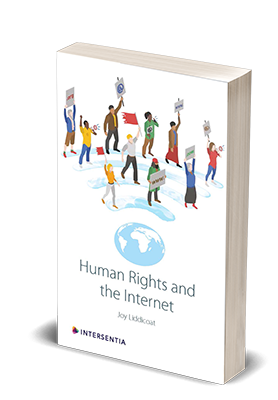| Interview |


Author speaking: Joy Liddicoat about Human Rights and the Internet
Joy Liddicoat (LLM) specialises in human rights, privacy and technology law. A former Human Rights Commissioner and Assistant Privacy Commissioner, Joy is President of InternetNZ, responsible for the country code top-level domain .nz. She has represented government, technical community and civil society organisations at national and international levels, including as an Internet Rights Specialist for the Association for Progressive Communications and at the International Corporation for Assigned Names and Numbers, ICANN. Joy lives in New Zealand and is a research affiliate with the Law Faculty at the University of Otago.
Why is this book necessary?
Right now, when many are feeling so disempowered, this book is a refreshing and much needed counter to the negative nature of many social media and Internet critiques. The book helps readers understand the emergence of human rights online through the powerful stories of people who made this happen, providing a much-needed positive perspective on the emergence and importance of human rights in the digital age.
You talk about how in a state of emergency there is an advance in the suppression of human rights on the internet. Why?
Human rights should only be limited to the extent absolutely necessary in an emergency. During the pandemic, the Internet has finally emerged as a place where we truly live. Yet as they grappled to deal with the pandemic, many governments responded to the surge in online activity defensively or out of fear: fear for their citizens’ health, fear of criticism, fear of making wrong decisions, or failing to make the right ones. This gave rise to suppression of rights online, such as content restrictions, limiting Internet access and policing online activities. In addition, the rapid ‘appification’ of the pandemic in the form of new digital contract tracing apps enabled new forms of surveillance.
What human rights violations on the internet are you most concerned about?
Internet shutdowns (which still happen in many countries), content filtering, the lack of accountability for human rights violations which occur in online platforms, and persecution of human rights defenders.
During COVID-19, we have spent more time in front of screens. What do you think about that trend?
We used to joke about people using the Internet to watch cats. Just the other day I saw an hilarious photo of a cat watching humans having an online meeting. What I’ve noticed during Covid-19 is the extraordinary ways in which people across the world have used the Internet to reach out to each other, share information, offer support, and help lift morale and spirits. Seeing these expressions of human rights in the digital age has been one of the surprising delights of the past year.
How do human rights and artificial intelligence relate to each other?
AI technologies are creating new social, legal and other tensions between their enormous potential benefits and equally significant risks. As the field of machine learning technologies rapidly evolves, new fault lines are emerging for human rights in the digital age, for example, between the lack of regulation and the new human rights violations emerging such as discrimination, racial and gender bias and lack of due process. In response, new rights are being proposed. These include the right to reasonable inferences from the results of an automated process, for a human in the loop of automated decision-making, for a right of appeal to a human, and even for new group rights to protect from discrimination based on membership of an algorithmically determined group.
Do we have the right to be forgotten?
On the Internet, the right to be forgotten simply means de-linking material from search engine results. Despite such de-linking, the material usually stays on the Internet: it does not disappear, but is just harder to find. A simple way to see this for yourself is to try the same search on different browsers – you will see different results. Another way is to carry out the same search by connecting to the Internet using a VPN and choose an IP address from a different country to the one you are in: again, you will likely see different search results. There are many good privacy related reasons for allowing search results to be de-linked, but this is not the same as ‘being forgotten’.
About the book


Human Rights and the Internet
This book is a short and accessible introduction to the concepts of human rights, the Internet and the emergence of an era of human rights online as a new legal challenge.
The past decade has witnessed unprecedented use of the Internet for both advancing and suppressing human rights, giving rise to complex new issues that can both inspire and overwhelm. With ever-growing concerns about the (non-)regulation of our digital environment, it is surprising that both the theoretical and practical application of human rights to the Internet and our online lives remain unclear.
The author combines theory with accessible, practical case studies to help readers understand human rights violations online, including Covid-19 digital contact tracing apps and the human rights implications of artificial intelligence.
It will be of interest to a broad range of readers: policy makers and informed citizens, lawyers working with human rights defenders, and legal and human rights academics examining the emergence of this legal field.
Joy Liddicoat
July 2021
ISBN 9781839700590